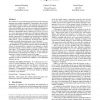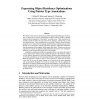159 search results - page 19 / 32 » An extended comparative study of language support for generi... |
TLDI
2010
ACM
14 years 4 months ago
2010
ACM
ML modules are a powerful language mechanism for decomposing programs into reusable components. Unfortunately, they also have a reputation for being “complex” and requiring fa...
ICFP
2006
ACM
14 years 7 months ago
2006
ACM
We present a unifying solution to the problem of fusion of functions, where both the producer function and the consumer function have one accumulating parameter. The key idea in t...
PLDI
2010
ACM
14 years 17 days ago
2010
ACM
Self-adjusting computation provides an evaluation model where computations can respond automatically to modifications to their data by using a mechanism for propagating modifica...
POS
1994
Springer
13 years 11 months ago
1994
Springer
We consider some issues in optimizing persistent programming languages. In particular, we show how to express optimizations of object residency checks in strongly typed persistent...
CI
2000
13 years 7 months ago
2000
Kowalski and Sergot's Event Calculus (EC) is a simple temporal formalism that, given a set of event occurrences, derives the maximal validity intervals (MVIs) over which prop...


